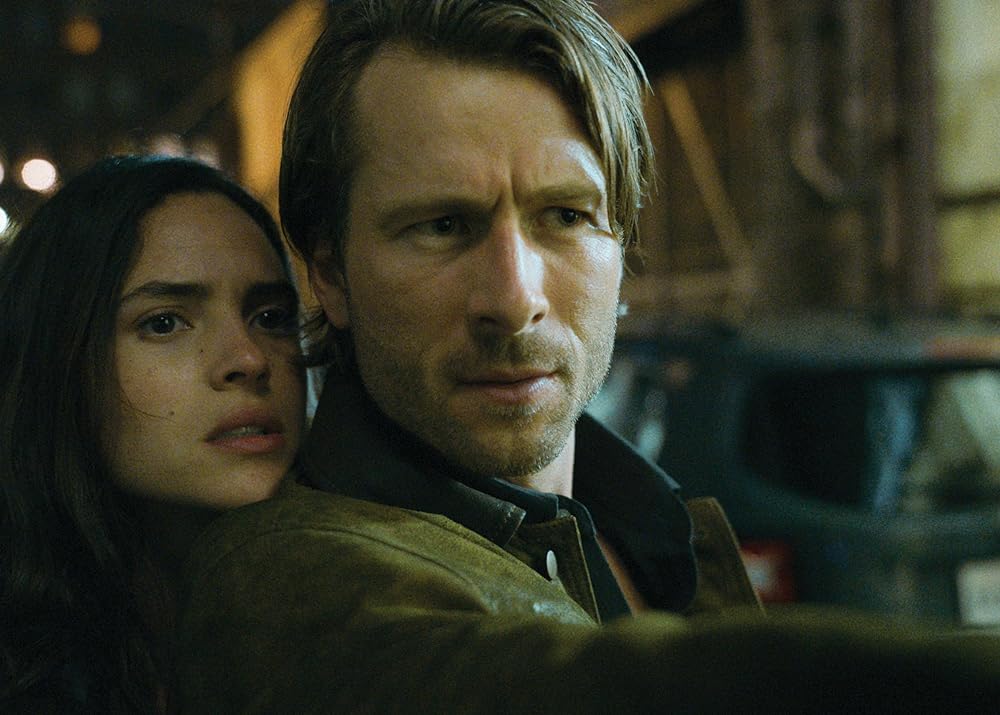In American popular culture, hit men are a ubiquitous force, the focus of countless movies, TV shows, and video games. Given the omnipresence of contract killers, you’d be forgiven for thinking that they must abound in reality. But in the opening minutes of director Richard Linklater’s newest movie, Hit Man, this idea is murdered with brisk efficiency.
We’re introduced to Gary Johnson (Glen Powell), a psychology and philosophy professor at the University of New Orleans who’s leading an ostensibly modest life. He’s unconcerned with material pleasures and lives with two cats—friendship and love have held little appeal for him since his amicable divorce. But in secret, he maintains a second job as an undercover cop. When eccentric fellow police officer Jasper (Austin Amelio) is suspended, Gary is forced to take over his work. Suddenly, he finds himself masquerading as a hit man to collect evidence against people who want to hire these contract killers.
Gary delivers a few strong performances that lead to convictions for his would-be contractors, and he soon realizes he’s been blessed with a natural talent for the work. He begins developing increasingly outlandish characters to play as his endlessly flexible role brings excitement back to his life. Complications arise, however, when he meets the alluring Madison (Adria Arjona), who asks him to kill her abusive husband. In the guise of a debonair and ruthless hit man named Ron, an infatuated Gary encourages Madison to drop the plan and start a new life. Eventually they begin a passionate affair, but when their romance becomes connected to a real murder, Gary finds himself tangled in a growing web of lies that could destroy all his identities at once.
Hit Man’s plot is a bubbly fusion of old-fashioned screwball comedy and Hitchcockian crime caper. (In its vibrant color scheme and emphasis on a preposterously complicated case of mistaken identity, the film frequently recalls North By Northwest.) Its central characters possess such striking physical appearances and exaggerated personalities that they almost seem more suited to 1980s professional wrestling than a contemporary thriller. Powell and Arjona are an attractive duo, and Linklater exploits their good looks as regularly and boldly as he can without seeming prurient (apparently, Gary and Madison share a taste for exceptionally tight clothing).
Fortunately, both actors are eminently charismatic. Powell’s performance is appropriately dynamic, alternating instantly between meek nervousness and brash self-assurance as he switches from Gary to Ron. Arjona, meanwhile, adroitly commands her own range of disparate emotional states. As the abused spouse desperately seeking an escape, she can be both diffident and pitiful. Later, when her relationship with Ron ignites, she becomes a zestful beacon of excitement and desire.
Powell and Arjona’s natural rapport sustains much of the film, but their dialogue is often devoid of the crisp wit that distinguishes the old Hollywood comedies Linklater clearly hopes to evoke. When Ron and Madison’s relationship is at its most playful, there’s an almost mawkish stiffness to much of their flirtatious banter, which fails to amuse as intended.
This problem extends beyond the two leads. Hit Man’s script contains a few sharp one-liners, but too many of its gags are rusty and dull. Linklater adopts a glacial pace for the film’s first half as we watch Gary move through personas, encountering a sordid assortment of characters who each have unique reasons for seeking a hit man’s services. These encounters unfold almost like vignettes, but they follow a repetitive format and offer largely pallid attempts at humor. As Gary cycles through disguises while the plot remains stationary, Hit Man is afflicted by the same air of pointlessness as an ill-conceived Saturday Night Live sketch.
But when Madison reappears in a gloriously uncomfortable third act, the film’s true conflict emerges and its narrative becomes remarkably more compelling. Linklater builds tension and refuses to release it, steering the audience to a surprisingly macabre climax. The earnestness that initially restrains the film subsides as its comedy turns toward the gallows and the mystery becomes redolent of vintage noir. Yet Linklater retains a sense of levity, and there’s a bouncy verve to his direction throughout that keeps the film’s tone consistent despite its atmospheric shifts. Too much of Hit Man amounts to little more than build-up, but when the film finally shifts into gear it accelerates without respite.
Linklater, who previously directed the Before trilogy and Boyhood, has always been equally preoccupied with whimsy and philosophy. Beneath Hit Man’s stylish cat-and-mouse crime antics, he’s interested in reflecting on identity and self-actualization. By inhabiting multiple personas, Gary allows himself to explore the various paths he could take through life without the burden of choice and consequence. On the surface, Ron is a facade that disguises Gary’s true inhibited self, but Gary plays the role so convincingly that the opposite could easily be true. Linklater posits that all of us share this desire and capacity for self-invention, and he questions why it nonetheless seems immoral for Gary to contemplate abandoning his established identity to spend the rest of his life as Ron.
None of these existential musings, however, are as profound or original as Linklater seems to believe. Hit Man’s narrative is frequently interrupted by scenes of Gary lecturing his students, his disquisitions bluntly explaining the film’s message. It’s an inelegant choice that drains the film of subtlety, leaving Linklater more akin to a weed-addled student pontificating about life’s mysteries in a college dorm than an artist content to equip his audience with the tools to consider those mysteries in a new light.
Hit Man is ultimately an intriguing combination of a modern thriller and a retro romantic farce that’s brought down by a script too often peppered with ideas from a freshman textbook. It’s flawed, but once the narrative finds direction it can genuinely excite. Linklater’s film might not be a consummate professional, but it’s worth hiring for at least one job.









Please note that we at The Dispatch hold ourselves, our work, and our commenters to a higher standard than other places on the internet. We welcome comments that foster genuine debate or discussion—including comments critical of us or our work—but responses that include ad hominem attacks on fellow Dispatch members or are intended to stoke fear and anger may be moderated.
With your membership, you only have the ability to comment on The Morning Dispatch articles. Consider upgrading to join the conversation everywhere.